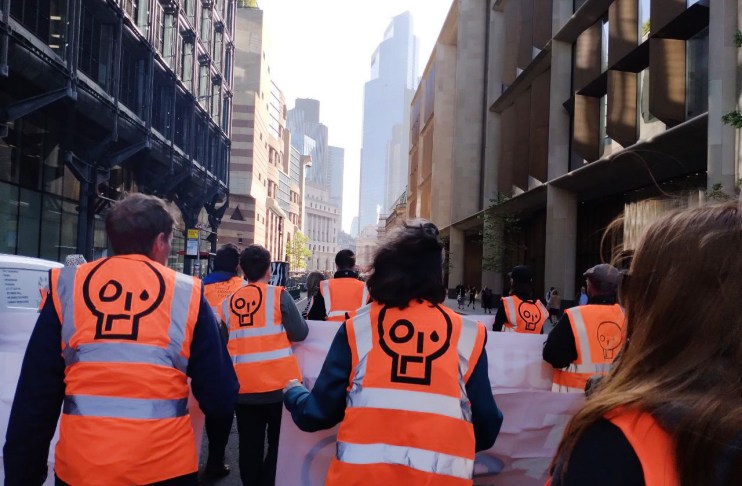Just Stop Oil’s Square Mile slow walk causes chaos as Bank and Moorgate brought to a halt

Just Stop Oil protestors caused chaos in the Square Mile this morning with a slow walk through Moorgate and Bank, which was eventually broken up by police.
The environmental group forced the closure of roads, prevented buses from getting through and led to police officers issuing a Section 12 order, forcing them onto the pavement.
It was reported that they were “slow walking in the road” in Moorgate just before half past eight this morning, and that they were “assessing the impact of the protest.”
One protestor was filmed talking to police, citing HSBC, NatWest and Lloyds banks’ funding for fossil fuels, saying they wouldn’t get them to stop doing it by sitting at home, while another confronted police saying: “Would you have told the suffragettes to get onto the pavement”.
The City of London Police said at 8.43am: “Just Stop Oil protesters are slowly walking in the road on Prince’s Street in the direction of Bank Junction. Officers are on the scene, engaging with protesters and will intervene if required to ensure minimal disruption to Londoners.”
Just before 9am, the Met said “section 12 conditions to move out of the road were placed on the Just Stop Oil procession on Moorgate as it was now causing serious disruption.”
At 09:09, the Metropolitan wrote: Following the implementation conditions, the Just Stop Oil procession at #Moorgate moved out of the road and onto the pavement. The road is now clear and traffic is flowing.
This comes after a new wave of environmental protests from Just Stop Oil, who use the tactic of ‘slow walking’ to disrupt traffic and close roads.

The group are demanding the end to exploration for new fossil fuels, and protesting a clause in the Public Order Bill which stops them from matching.
This is the moment a police officer issued the group marching through the square mile with a Section 12 notice:
A Just Stop Oil spokesperson said: “The Public Order Bill and specifically Section 12 notices are being used to remove the British public’s right to peacefully oppose government policies that threaten the lives of hundreds of millions of people.
“Marching has been an integral means of bringing about social change for centuries, be it for those seeking universal suffrage, those seeking to gain equality, or those seeking to make transport accessible for disabled people.”
